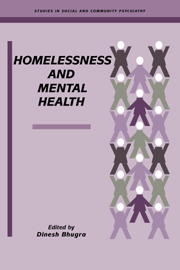Book contents
- Frontmatter
- Contents
- List of contributors
- Preface
- Part I INTRODCTION AND SPECIAL GROUPS
- Part II SERVICES
- 7 Services for the mentally ill homeless
- 8 Clinical work with homeless people in the USA
- 9 The severely mentally ill in hostels for the homeless
- 10 Old and homeless in London and New York City: a cross-national comparison
- 11 Primary health care of the single homeless
- Part III INTERNATIONAL PERSPECTIVE
- Part IV POLICY AND EVALUATION
- Index
9 - The severely mentally ill in hostels for the homeless
from Part II - SERVICES
Published online by Cambridge University Press: 15 October 2009
- Frontmatter
- Contents
- List of contributors
- Preface
- Part I INTRODCTION AND SPECIAL GROUPS
- Part II SERVICES
- 7 Services for the mentally ill homeless
- 8 Clinical work with homeless people in the USA
- 9 The severely mentally ill in hostels for the homeless
- 10 Old and homeless in London and New York City: a cross-national comparison
- 11 Primary health care of the single homeless
- Part III INTERNATIONAL PERSPECTIVE
- Part IV POLICY AND EVALUATION
- Index
Summary
Introduction
The terms ‘shelter’, ‘hostel’ and ‘lodging house’ have been used interchangeably by most UK commentators on homelessness. Unfortunately the imprecise use of these terms has obscured important differences between two distinct types of accommodation that have traditionally been provided for the single homeless in the UK. In this chapter these two types of accommodation will be referred to as shelter accommodation and hostel accommodation. If we are to make sense of the UK studies of homeless people with mental disorder it is necessary to reassert the distinction between shelter and hostel accommodation. Consequently this chapter will begin by defining hostel and shelter accommodation. Studies of homeless people in the UK will then be classified into hostel or shelter populations. The findings revealed by this reclassification will then be discussed. Finally, on the basis of these findings, the size of the mentally ill hostel population, and the characteristics of its members, will be discussed. The effectiveness of hostels for the homeless in caring for people with severe psychiatric disorder is discussed in Chapter 16.
Shelters and hostels
Definition of shelter and hostel accommodation
Shelters will be defined as buildings offering emergency overnight accommodation to single homeless people. Hostels will be defined as buildings (other than cheap bedsits) offering board and lodgings to single homeless people. Because of their different functions, shelter and hostel accommodation tend to cater for different populations. Shelter accommodation caters for a transient population consisting of whoever happens to turn up on a particular night, whereas hostel accommodation caters for a relatively ‘permanent’ group of ‘residents’, who will live in the hostel by day and occupy the same bed, or room, at night.
- Type
- Chapter
- Information
- Homelessness and Mental Health , pp. 133 - 149Publisher: Cambridge University PressPrint publication year: 1996
- 1
- Cited by

